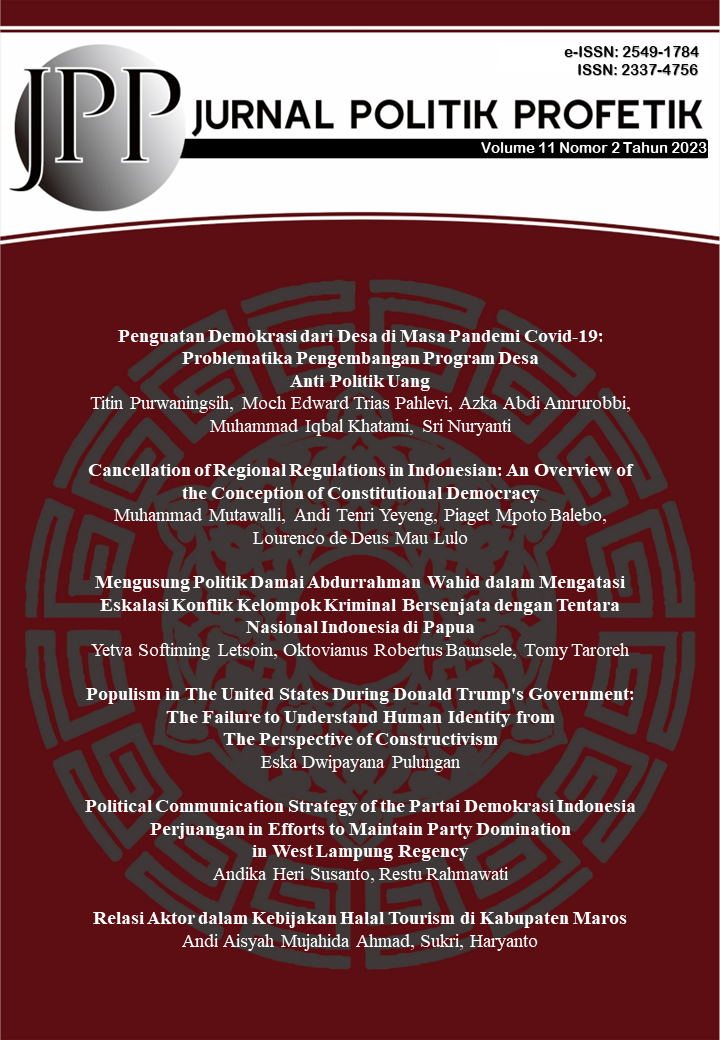Cancellation of Regional Regulations in Indonesian: An Overview of the Conception of Constitutional Democracy
Abstrak
In connection with the decision of the Constitutional Court Number 137/PUU-XIII/2015, this study examined the cancellation of regional regulations reviewed in Indonesia's constitutional system. The research method is normative legal research, or looking at the laws and regulations that are in effect. This study also collects legal materials using the library method, which are presented qualitatively and descriptively. This study will demonstrate the connection between the cancellation of regional regulations and the authority and position of the Minister of Home Affairs as assistant to the president in the Indonesian constitutional system. The regional regulation was scrapped because it was thought to make it harder to make investments in Indonesia. The Republic of Indonesia's central government has the authority to oversee the administration of regional governments, overseeing every regional regulation and regional head regulation. Be that as it may, after the choice of the Protected Court, the Clergyman and lead representative as delegates of the focal government never again have the position to drop a territorial guideline. In conclusion, this study reveals that the governor and the Ministry of Home Affairs can only cancel regional regulations that conflict with higher regulations, are not in line with interests, or violate moral norms in general through the process of testing regional regulations before they are enacted (executive). preview). This is different from the situation before the Constitutional Court's decision, when the Minister of Home Affairs and the Governor still held authority.
##plugins.generic.usageStats.downloads##
Referensi
Al Anwari, K. A. (2018). Kajian Yuridis Pembatalan Peraturan Daerah (Studi Putusan Nomor 137/PUU-XIII/2015). Universitas Jember.
Asshiddiqie, J. (2010). Model-Model Pengujian Konstitusional di Berbagai Negara. Jakarta: Sinar Grafika.
Bonadi, A., Syafa’at, R., & Sudarsono, S. (2019). Analisis Putusan Mahkamah Konstitusi Nomor: 137/PUU-XIII/2015 tentang Pembatalan Kewenangan Gubernur dalam Pembatalan Peraturan Daerah Kabupaten/Kota. Jurnal Ilmiah Pendidikan Pancasila Dan Kewarganegaraan, 4(1), 1–14.
Latief, H. A. (2005). Hukum dan Kebijakan (Beleidsregel) pada Pemerintahan Daerah UII Press. Yogyakarta: UII Press.
Mahkamah Agung. (2011). Perma Nomor 1 Tahun 2011 tentang Hak Peninjauan Kembali. Jakarta: Mahkamah Agung Republik Indonesia.
Mahkamah Konstitusi. (2015). Putusan Nomor 137/PUU-XIII/2015 tentang Demi Keadilan Berdasarkan Ketuhanan Yang Maha Esa. Jakarta: Mahkamah Konstitusi Republik Indonesia.
Mahkamah Konstitusi. (2016). Putusan Nomor 56/PUU-XIV/2016 tentang Demi Keadilan Berdasarkan Ketuhanan Yang Maha Esa. Jakarta: Mahkamah Konstitusi Republik Indonesia.
Manan, B. (1994). Pelaksanaan Demokrasi Pancasila dalam Pembangunan Jangka Panjang II. Makalah Dalam Loka Karya Pancasila.
Mutawalli, M. (2022). Kewenangan Presiden dalam Pemberhentian Kepala Daerah yang Tidak Melaksanakan Program Strategis Nasional di Indonesia. Juris: Jurnal Kajian Ilmu Hukum, 12(2), 93–113.
Mutawalli, M. (2023). Negara Hukum Kedaulatan dan Demokrasi (Konsepsi Teori dan Perkembangannya). Surabaya: Pustaka Aksara.
Mutawalli, M., Ayub, Z. A., & Faga, H. P. (2023). Revitalizing Political Parties in Indonesia: Dissecting Patronage-Clientelism Dynamics vis-à-vis Political Representation. Jurnal Mengkaji Indonesia, 2(2), 301–326. https://doi.org/10.59066/jmi.v2i2.467
Nugroho, F. B. S. (2019). Sifat Keberlakuan Asas Erga Omnes dan Implementasi Putusan Mahkamah Konstitusi. Gorontalo Law Review, 2(2), 95–104.
Pakpahan, R. H. (2010). Pengujian Peraturan Daerah oleh Lembaga Eksekutif & Yudikatif. Universitas Sumatera Utara, Medan.
Ramadani, D. (2018). Kewenangan Pembatalan Peraturan Daerah pada Tahapan Evaluasi dan Klarifikasi. Badamai Law Journal, 3(2), 264–282.
Republik Indonesia. (1945). Undang-Undang Dasar Negara Republik Indonesia Tahun 1945. Jakarta: Sekretariat Negara.
Republik Indonesia. (2009). Undang-Undang Republik Indonesia Nomor 3 Tahun 2009 tentang Mahkamah Agung. Jakarta: Sekretariat Negara.
Republik Indonesia. (2011). Undang-Undang Republik Indonesia Nomor 12 Tahun 2011 tentang Pembentukan Peraturan Perundang-Undangan. Jakarta: Sekretariat Negara.
Republik Indonesia. (2014). Undang-Undang Republik Indonesia Nomor 23 Tahun 2014 tentang Pemerintahan Daerah. Jakarta: Sekretariat Negara.
Seidman, A., Seidman, R. B., & Abeyserkere, N. (2002). Penyusunan Rancangan Undang-Undang dalam Perubahan Masyarakat yang Demokratis. Jakarta: Elips Departemen Kehakiman dan Hak Asasi Manusia Republik Indonesia.
Sihombing, E. N. (2017). Perkembangan Kewenangan Pembatalan Peraturan Daerah dan Peraturan Kepala Daerah: Kajian Putusan Mahkamah Konstitusi Nomor 137/PUU-XIII/2015 dan Nomor 56/PUU-XIV/2016. Jurnal Yudisial, 10(2), 217–234.
Soehino. (1997). Hukum Tata Negara: Penyusunan dan Penetapan Peraturan Daerah. Yogyakarta: Liberty.
Suardana, I. W., Budiarta, I. D. G., & Surya, I. K. A. D. I. (2019). Menguji Kewenangan Pembatalan Peraturan Daerah (Kajian Secara Normatif). Majalah Ilmiah Universitas Tabanan, 16(1), 46–52.
Tamimu, A. R. (2019). Pembatalan Peraturan Daerah Menurut Undang-Undang Nomor 9 Tahun 2015 tentang Perubahan Kedua atas Undang-Undang Nomor 23 Tahun 2014 tentang Pemerintah Daerah. Lex Administratum, 7(2).
Van der Vlies, I. C. (2005). Buku Pegangan Perancang Peraturan Perundang-undangan diterjemahkan oleh Linus Doludjawa. Jakarta: Direktorat Jenderal Peraturan Perundang-Undangan Kementerian Hukum dan Hak Asasi Manusia RI.
Wicaksono, K. W. (2012). Problematika dan Tantangan Desentralisasi di Indonesia. Jurnal Bina Praja, 4(1), 21–28.
##submission.copyrightStatement##
##submission.license.cc.by-nc-sa4.footer##














